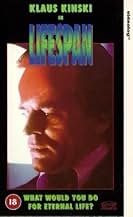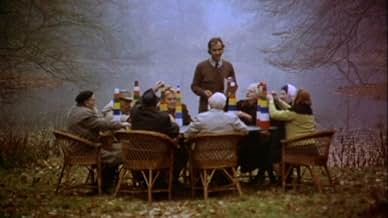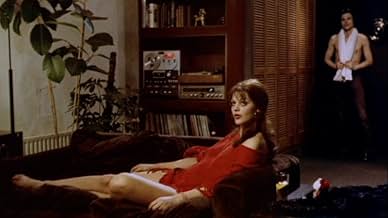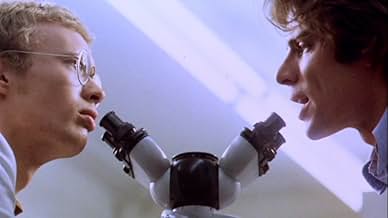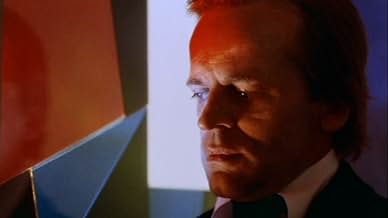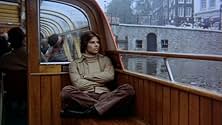Ajouter une intrigue dans votre langueA doctor trying to develop a serum to lengthen life tries his formula out on the unsuspecting residents of an old-age home.A doctor trying to develop a serum to lengthen life tries his formula out on the unsuspecting residents of an old-age home.A doctor trying to develop a serum to lengthen life tries his formula out on the unsuspecting residents of an old-age home.
Frans Mulder
- Pim Henke
- (as Franz Mulder)
Dick Scheffer
- Official from ministry of science
- (as Dick Schefer)
Histoire
Le saviez-vous
- AnecdotesAt one point in the film, Tina Aumont is put into some "DNA helix" bondage as part of some consensual lovemaking with Dr. Land. Some bondage fans believe this is the first appearance of Japanese shibari bondage in a mainstream Western film.
- Autres versionsWhen released on VHS in 1987 in the UK, the BBFC made cuts of 1 minute 14 seconds to achieve an '18' rating. These cuts were waived when released again on video on 22 May 1995.
Commentaire en vedette
Despite the rather lethargic pace, this is an absorbing conspiracy thriller on an existentialist theme. As it was shot in English, even if most of the voices were eventually re-dubbed at a later stage, Fons Rademakers' heavy accent makes his dialogue hard to understand at times!
Anyway, many have found Hiram Keller's inexpressive performance a detriment to the film but I rather liked it (and so, apparently, does director Whitelaw!); the fact that a lot of the exposition is imparted through narration has been criticized as well, but I also thought this worked very well for the film. Much has also been said about the notorious (and oft-censored) bondage scene involving Tina Aumont (well cast here): actually, it's very discreetly done and pretty short in itself! And though Klaus Kinski doesn't get to exert his acting muscles a great deal, his Mephistophelean presence adds to the film's uniquely disquieting aura. Besides, the Amsterdam setting (and Eddy van der Enden's lugubrious photography of it) is a big plus, as is Terry Riley's electronic score.
Whitelaw's rather choppily edited interview and full-length Audio Commentary (moderated by Mondo Macabro's Peter Tombs) are very interesting: the director explains several points which may not have been very clear and draws attention to the irony which is present in his script. Besides recounting many an amusing anecdote about the production (Kinski turning up on set dressed as a Mexican bandit and Whitelaw having to calmly persuade him that his role of "The Swiss Man" was somewhat different!; Kinski's minimal dialogue was also the result of his dislike of the script, whereupon whole chunks of lines he was supposed to say were unceremoniously thrown out!) and the censorship problems the film encountered (the director tried to convince the U.K. censors that the bondage scene was relevant to the main theme by arguing that this kinky act highlighted a woman's breasts which, by storing milk, are themselves a symbol of immortality!). Whitelaw also puts the unresolved and apparently downbeat ending in the context of the film's theme by saying that a picture about immortality, i.e. the desire that one's life doesn't come to an end, could never have a conventional finish as that would mean it was actually embracing death! Interestingly, he mentions too that Roman Polanski (who was a member of the jury where LIFESPAN won an award) had admired the picture a lot - and this was eventually reflected in his own next film, THE TENANT (1976), to which it bears a striking resemblance plot-wise (though itself based on a work of fiction by Roland Topor, of which Whitelaw was completely unaware at the time)!!
Anyway, many have found Hiram Keller's inexpressive performance a detriment to the film but I rather liked it (and so, apparently, does director Whitelaw!); the fact that a lot of the exposition is imparted through narration has been criticized as well, but I also thought this worked very well for the film. Much has also been said about the notorious (and oft-censored) bondage scene involving Tina Aumont (well cast here): actually, it's very discreetly done and pretty short in itself! And though Klaus Kinski doesn't get to exert his acting muscles a great deal, his Mephistophelean presence adds to the film's uniquely disquieting aura. Besides, the Amsterdam setting (and Eddy van der Enden's lugubrious photography of it) is a big plus, as is Terry Riley's electronic score.
Whitelaw's rather choppily edited interview and full-length Audio Commentary (moderated by Mondo Macabro's Peter Tombs) are very interesting: the director explains several points which may not have been very clear and draws attention to the irony which is present in his script. Besides recounting many an amusing anecdote about the production (Kinski turning up on set dressed as a Mexican bandit and Whitelaw having to calmly persuade him that his role of "The Swiss Man" was somewhat different!; Kinski's minimal dialogue was also the result of his dislike of the script, whereupon whole chunks of lines he was supposed to say were unceremoniously thrown out!) and the censorship problems the film encountered (the director tried to convince the U.K. censors that the bondage scene was relevant to the main theme by arguing that this kinky act highlighted a woman's breasts which, by storing milk, are themselves a symbol of immortality!). Whitelaw also puts the unresolved and apparently downbeat ending in the context of the film's theme by saying that a picture about immortality, i.e. the desire that one's life doesn't come to an end, could never have a conventional finish as that would mean it was actually embracing death! Interestingly, he mentions too that Roman Polanski (who was a member of the jury where LIFESPAN won an award) had admired the picture a lot - and this was eventually reflected in his own next film, THE TENANT (1976), to which it bears a striking resemblance plot-wise (though itself based on a work of fiction by Roland Topor, of which Whitelaw was completely unaware at the time)!!
- Bunuel1976
- 18 juin 2006
- Lien permanent
Meilleurs choix
Connectez-vous pour évaluer et surveiller les recommandations personnalisées
- How long is Lifespan?Propulsé par Alexa
Détails
- Date de sortie
- Pays d’origine
- Langue
- Aussi connu sous le nom de
- Lifespan - Das Geheimnis des Lebens
- Lieux de tournage
- société de production
- Consultez plus de crédits d'entreprise sur IMDbPro
- Durée1 heure 17 minutes
- Mixage
- Rapport de forme
- 1.85 : 1
Contribuer à cette page
Suggérer une modification ou ajouter du contenu manquant


